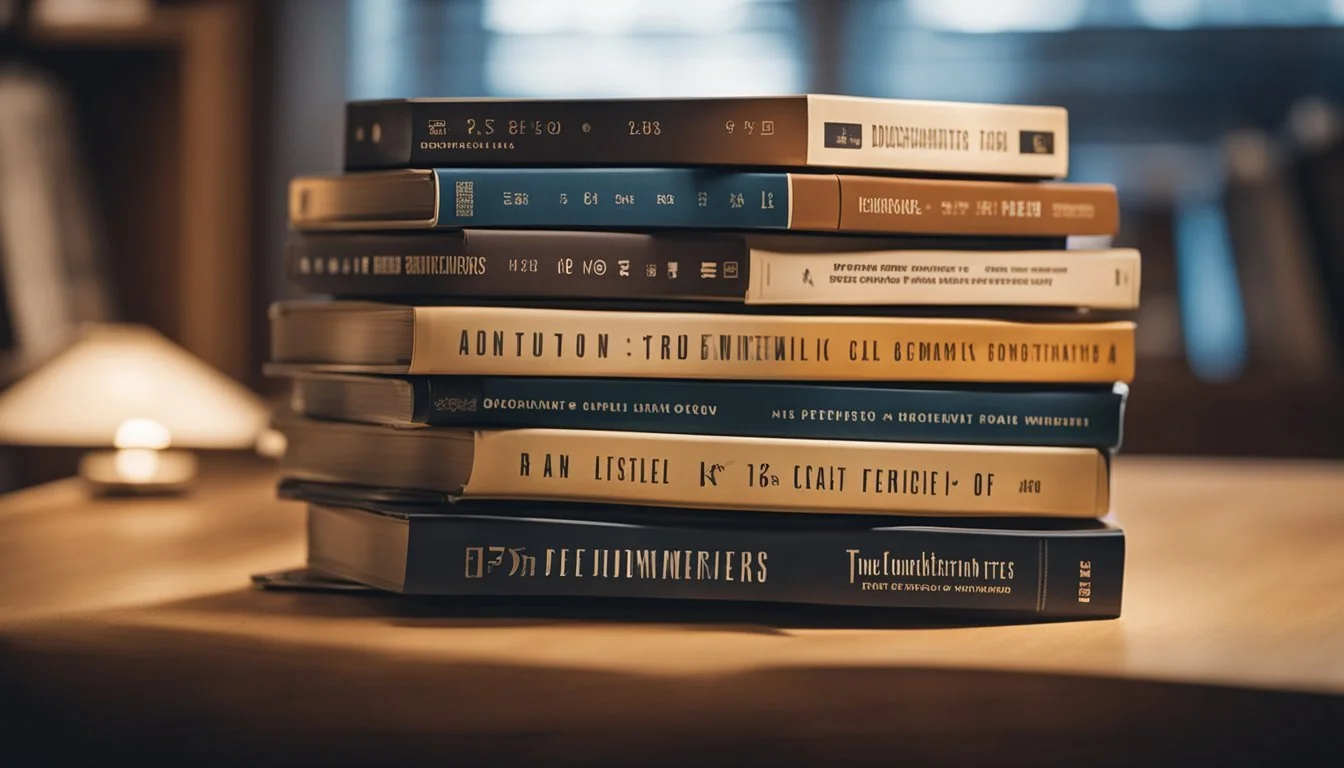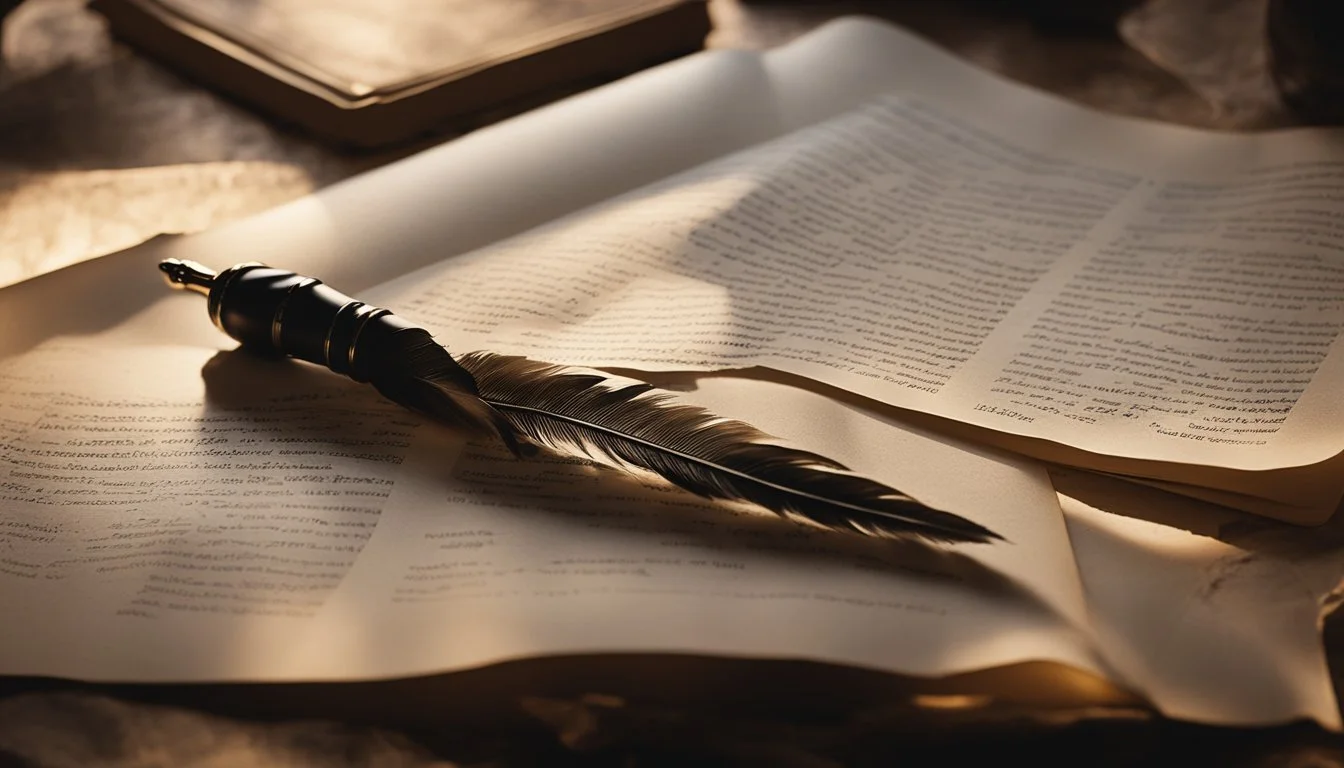10 Documentaries on the Craft of Writing
A Deep Dive into the Creative Process
Documentaries offer a fascinating glimpse into the often enigmatic world of writing, providing viewers a behind-the-scenes look at the minds and methods of renowned authors. These films capture the essence of the literary craft, demonstrating the highs and lows that writers experience as they bring their stories to life. Whether it's through personal interviews, archival footage, or the narration of their works, these documentaries paint a vivid picture of what it takes to be a writer.
For aspiring writers and literary enthusiasts, these documentaries offer invaluable perspectives on the writing process and the lives of some of literature's most influential figures. From the daily routines of celebrated authors to their sources of inspiration, these films serve as both educational tools and sources of creative motivation. They also highlight the unique journeys of writers from varied backgrounds and genres, showcasing the diversity and richness of the literary world.
1) The Words: The Origins of Writing
"The Words: The Origins of Writing" dives into the early history of writing systems, examining how they emerged from primitive symbols and evolved into complex scripts.
The documentary focuses on ancient civilizations such as the Sumerians, Egyptians, and Chinese, who each developed unique writing systems that transformed communication.
It highlights the significance of materials used for writing, like clay tablets, papyrus, and bamboo, and how these materials influenced the development of scripts.
Additionally, the film explores the impact of writing on societal structures, governance, and culture, demonstrating how written records shaped historical narratives.
For more information, visit IMDB. (2020)
2) Author: The JT LeRoy Story (2016)
"Author: The JT LeRoy Story" delves into the intriguing and convoluted tale of Laura Albert and her creation of the literary persona JT LeRoy.
The film explores how Albert, writing as LeRoy, captivated the literary world with supposed autobiographical works portraying an HIV-positive teenage hustler. This narrative earned extensive acclaim.
Through interviews and archival footage, the documentary reveals the intricate nature of Albert's deception and the subsequent scandal when the truth emerged. Viewers get to witness Albert's emotions and insights about her unconventional path to literary fame.
Director Jeff Feuerzeig presents a detailed account of the events, making it a fascinating study of identity, creativity, and the boundaries of truth in storytelling.
More information about the film can be found on IMDb.
3) Can You Ever Forgive Me? (2018)
Can You Ever Forgive Me? offers a unique lens into the world of writing through the experiences of Lee Israel, a biographer turned literary forger. Directed by Marielle Heller, the film captures Israel's struggle to reclaim her place in the literary world.
Lee Israel, portrayed by Melissa McCarthy, finds herself out of work and desperate. She resorts to forging letters from deceased literary figures, a risky yet creative endeavor. Her actions reveal the pressures authors face to remain relevant and financially stable.
Melissa McCarthy's performance adds depth to the portrayal of Israel, offering viewers a glimpse into the darker, less glamorous side of a writing career. The film also explores themes of identity, ambition, and the ethical boundaries of creativity.
Richard E. Grant's role as Jack Hock, Israel's accomplice, brings both humor and a sense of camaraderie to the story. Their partnership highlights the lengths to which some writers might go in the face of adversity.
For more information, visit Wikipedia.
4) Joan Didion: The Center Will Not Hold (2017)
Joan Didion: The Center Will Not Hold is a poignant documentary that delves into the life and work of the American literary icon, Joan Didion. Directed by her nephew, Griffin Dunne, this film offers a uniquely intimate look at Didion's career and personal experiences.
The documentary covers Didion's early successes, such as winning a writing contest by Vogue, which led to her influential piece on self-respect. Viewers gain insights into Didion's significant contributions to American journalism and literature, capturing her distinct style and approach to writing.
The film also explores Didion's close relationships, including her marriage to John Gregory Dunne and their life with their daughter, Quintana Roo Dunne. This personal perspective is enhanced by family photos and interviews, providing depth and context to Didion's work.
Joan Didion: The Center Will Not Hold touches on her notable works, such as "The Year of Magical Thinking," which reflects on the loss and grief she experienced. This documentary is a must-watch for anyone interested in the craft of writing and the life of one of America's most compelling authors.
Learn more about the film on IMDb.
5) The Great American Lie (2020)
"The Great American Lie" examines how America's value system, driven by ideals of money, power, and control, has institutionalized inequality. Directed by Jennifer Siebel Newsom, this 2020 documentary scrutinizes how extreme masculine ideals have shaped American society.
Through interviews with various experts, the film highlights the impact of these values on social and economic mobility.
The documentary premiered at the San Francisco International Film Festival in 2019. Its exploration of gendered values provides a unique lens on societal issues, making it a relevant watch for those interested in understanding the broader implications of cultural norms on equality.
For more information, visit IMDb.
6) How to Write a Bestseller
Writing a bestseller requires a mix of skill, strategy, and a bit of luck. First, authors need to understand their target audience. Knowing who will read the book helps in tailoring the content to meet their expectations and preferences.
Crafting a compelling story is crucial. The plot should be engaging with well-developed characters and a narrative that keeps readers hooked from beginning to end.
Consider market trends and popular genres. While it's essential to write about what you are passionate about, aligning that with current market demands can increase the chances of success.
Professional editing is a must. A well-edited book ensures clarity, coherence, and a polished finish. This also includes proofreading to eliminate any grammatical errors and inconsistencies.
Marketing plays a significant role in the success of a bestseller. Authors should leverage social media, book tours, and other publicity strategies to generate buzz around their book.
Lastly, persistence is key. Writing a bestseller might not happen overnight. Continuous learning, writing, and refining are necessary to improve and increase the chances of creating a bestselling book.
More information: writing a bestseller.
7) Becoming Astrid (2018)
"Becoming Astrid" explores the early life of Swedish author Astrid Lindgren, best known for creating the beloved character Pippi Longstocking. Directed by Pernille Fischer Christensen, the film provides a detailed look at the experiences that shaped Lindgren's creative journey.
The narrative features a compelling portrayal by Alba August as young Astrid. Through her performance, the audience gains insight into the struggles and triumphs Lindgren faced, which later influenced her writing.
The film is an international co-production between Sweden and Denmark. It combines thoughtful cinematography and an evocative score, enhancing the emotional depth of Lindgren's personal story.
"Becoming Astrid" doesn't just celebrate Lindgren's literary accomplishments. It delves into her personal struggles, including unplanned motherhood and societal expectations, offering a fuller picture of the woman behind the iconic stories.
For more information, visit Wikipedia.
8) Trumbo (2015)
This documentary focuses on the life and work of Dalton Trumbo, a significant figure in Hollywood's history. Known for his exceptional screenwriting skills, Trumbo's career faced a severe obstacle due to the Hollywood blacklist.
The film delves into Trumbo's experiences with the House of Un-American Activities Committee hearings. Accused of promoting communist ideas, he was blacklisted, leading to imprisonment and a significant impact on his career.
Despite the blacklist, Trumbo continued to write under pseudonyms. His uncredited work won two Academy Awards, showcasing his relentless dedication to the craft of writing. The documentary also explores his creative process and his contributions to major films like "Roman Holiday" and "Spartacus."
For more information, visit IMDb.
9) Death of a Gentleman (2015)
"Death of a Gentleman" explores the intersection of cricket and modern commerce.
Directed by Sampson Collins, Jarrod Kimber, and Johnny Blank, the film chronicles the impact of ICC governance on cricket's global future.
The documentary features insights from influential figures like Giles Clarke, N Srinivasan, and cricket personalities like Ed Cowan, Tony Greig, and Chris Gayle.
Through compelling interviews and analysis, it discusses the effects of the 'Big Three' takeover on international cricket. It delves into the dynamics of power and the role of professional administrators in shaping the sport.
To learn more, visit Wikipedia.
10) Great Writers: Franz Kafka
Franz Kafka is a giant in the world of literature. His works, such as "The Metamorphosis" and "The Trial," have left an indelible mark on modern literature. Despite his relatively short life, his writings delve into themes of existential dread and bureaucratic absurdity, making him a pivotal figure in 20th-century literature.
A notable documentary, "Franz Kafka - Writer between the Worlds" (2018), directed by Herbert Kafka, explores his life and legacy. It features insights from those who knew him and delves deeply into his literary contributions. This documentary helps viewers understand how Kafka's unique experiences and perspectives influenced his work.
Max Brod, Kafka's friend and biographer, plays a significant role in preserving Kafka's writings. The TV miniseries "Kafka" also covers this relationship, highlighting Brod's relentless efforts to promote Kafka's work posthumously. This series is a profound look into both Kafka’s personal life and his enduring influence.
To explore more about Franz Kafka, his life story, and how his writing continues to resonate, viewers can also watch "Do You Know Kafka?" This documentary attempts to peel back the layers of myth surrounding Kafka, presenting a balanced view of his enigmatic personality. It reinterprets his legacy and offers new angles on his life's work.
Learn more about Kafka through the IMDb page for "Franz Kafka - Writer between the Worlds".
Discover the legacy and influence through the Arte documentary "Do You Know Kafka?" (link).
The Power Of Storytelling In Documentaries
Storytelling in documentaries not only informs but also deeply resonates with audiences. It combines narrative techniques and visual elements to bring real-life events and characters to life, shaping viewers' perceptions and evoking emotional responses.
Narrative Techniques
Documentary filmmakers use a variety of narrative techniques to engage their audiences. Personal testimonies and interviews offer firsthand accounts that add authenticity and emotional depth. Archival footage, including photos and videos, helps to create a vivid historical context.
Structured narrative arcs give documentaries a clear beginning, middle, and end, maintaining viewers' interest. By weaving together multiple storylines, filmmakers can present different perspectives on a single issue, enhancing the complexity and richness of the narrative.
Impact On Audience
The impact of storytelling in documentaries is profound. Well-crafted narratives can raise awareness about social issues, influence public opinion, and inspire action. Emotionally charged stories can create a deep connection with viewers, making the subjects and their struggles relatable and memorable.
By shedding light on hidden truths or underrepresented topics, documentaries can transform viewers' understanding of the world. The use of compelling narratives ensures that the message is not just heard but felt, leaving a lasting impression.
Interviews With Successful Writers
Interviews with prominent writers provide invaluable insights into their creative process and the obstacles they've faced. These interactions help aspiring writers understand both the inspiration behind successful works and the challenges encountered along the way.
Insights And Inspirations
Successful writers often share the sources of their creativity during interviews. For instance, Joan Didion’s sharp prose balanced joys and tragedies as highlighted in her documentary "Joan Didion: The Center Will Not Hold." Kurt Vonnegut’s blend of satire and dark humor, explored in his documentary, reveals how personal experiences shaped his storytelling.
Interviews with these writers frequently highlight the importance of drawing inspiration from daily life and socio-political events. Many celebrated authors emphasize the necessity of maintaining a disciplined writing routine. Interviews also often capture personal anecdotes and pivotal moments that sparked their most acclaimed works.
Challenges Faced
Even the most successful writers encounter significant hurdles in their careers. The documentary on Harlan Ellison, featuring insights from personalities like Neil Gaiman and Robin Williams, underscores the highly imaginative yet often misunderstood nature of his work. Ellison's challenges included industry misconceptions and creative battles.
Writers like Charles Bukowski, as depicted in "Bukowski: Born into This," faced numerous personal and professional struggles, including financial instability and critical rejection. Such interviews shed light on the perseverance required to sustain a writing career. Often, these accounts reveal the resilience needed to overcome rejection and maintain relevance in a highly competitive field.
Exploring Different Genres Of Writing
Genres provide unique structures, styles, and conventions that shape both the creative process and the final product. Understanding the distinctions between fiction and non-fiction, as well as the challenges of adapting written works, is essential for any writer.
Fiction vs. Non-Fiction
Fiction and non-fiction are the two primary categories of writing. Fiction involves creative storytelling, crafted from the imagination, while non-fiction is based on real events and factual information.
Fiction includes genres like fantasy, science fiction, mystery, and literary fiction. Authors create characters, settings, and plots, using narrative techniques to engage readers. Elements like dialogue, descriptive language, and pacing are pivotal.
Non-Fiction, on the other hand, encompasses genres like memoirs, biographies, essays, and journalistic writing. This type of writing prioritizes accuracy and often involves research. It aims to inform, educate, or explain, with emphasis on clarity and factual integrity.
Adapting Written Works
Adapting written works involves transforming a piece from one genre or medium to another. This process requires careful consideration of the original material's essence while making necessary adjustments.
For example, adapting a novel into a screenplay involves translating internal character thoughts and complex narratives into visual and auditory experiences suitable for film. Writers must focus on dialogue and visual elements.
Adaptations can also involve changing genres altogether. A memoir could be adapted into a novel, requiring fictionalization of some elements to craft a compelling narrative while maintaining the essence of the true story.
Challenges include preserving the original's core message and ensuring that the new format appeals to its intended audience.







